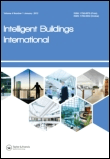
Intelligent Buildings International
Scope & Guideline
Pioneering the Future of Smart Building Technologies
Introduction
Aims and Scopes
- Sustainable Building Practices:
The journal emphasizes research on sustainable architecture and construction methods, including biomimicry, renewable energy technologies, and low-carbon design strategies that contribute to environmental sustainability. - Integration of Intelligent Technologies:
A core focus is on the integration of smart technologies within building systems, such as Building Information Modeling (BIM), digital twins, and artificial intelligence (AI) applications to enhance building performance and management. - User-Centric Design and Well-being:
Research addressing the impact of building design on occupant health, well-being, and productivity is a significant area of interest, exploring biophilic design, environmental quality, and user satisfaction. - Urbanization and Smart Cities:
The journal covers themes related to urbanization, including smart city planning, land use optimization, and the role of intelligent buildings in urban environments. - Innovative Construction Techniques:
Exploration of advanced construction techniques, such as prefabrication, adaptive building envelopes, and 3D printing technologies, is a consistent focus, highlighting their implications for efficiency and sustainability.
Trending and Emerging
- Neuroarchitecture and Bioethics:
An emerging focus on the ethical implications of neuroarchitecture highlights the intersection of psychology and architecture, aiming to understand how design choices impact human behavior and well-being. - Nature-Based Solutions:
The exploration of integrating nature-based solutions into construction practices reflects a growing recognition of the importance of biophilic design and ecological approaches in the built environment. - Smart Building Management Systems:
A trend towards the development and application of digital twin technologies and advanced facility management systems showcases the increasing reliance on intelligent systems for optimizing building operations. - AI and Machine Learning Applications:
Research utilizing AI and machine learning for predictive modeling and optimization in building design and energy management is gaining momentum, indicating a shift towards data-driven methodologies. - Health and Well-being in Workspaces:
There is a rising interest in studies examining the effects of workplace environments on health, well-being, and productivity, emphasizing the importance of user-centric design in intelligent buildings.
Declining or Waning
- Traditional Construction Methods:
There has been a noticeable decrease in publications focusing solely on conventional construction practices, as the field moves toward innovative and technologically integrated approaches. - Basic Environmental Assessments:
Research centered around basic indoor environmental quality assessments without the integration of advanced technologies or methodologies appears to be waning, suggesting a shift towards more complex evaluations. - Generalized Energy Performance Studies:
Studies that provide generalized assessments of energy performance without specific applications of new technologies or innovative strategies are becoming less prominent, indicating a move towards more specialized or technologically driven research. - Non-Intelligent Building Applications:
Publications that do not incorporate intelligent systems or smart technologies in building design and management are appearing less frequently, reflecting the journal's evolving focus towards intelligent solutions. - Static Design Methodologies:
The journal seems to be moving away from static design methodologies that do not involve adaptive or responsive systems, as the emphasis shifts toward dynamic, user-centric design approaches.
Similar Journals
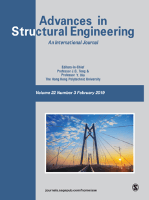
ADVANCES IN STRUCTURAL ENGINEERING
Advancing the Frontiers of Engineering ResearchADVANCES IN STRUCTURAL ENGINEERING, published by SAGE PUBLICATIONS INC, is a leading journal dedicated to the advancement of knowledge in the fields of Building and Construction, as well as Civil and Structural Engineering. With a solid impact factor and a commendable Scopus ranking (Rank #60 in Building and Construction, Rank #105 in Civil and Structural Engineering), this journal stands at the forefront of academic research, providing a platform for high-quality articles that contribute significantly to the discipline. Covering a range of topics from innovative construction techniques to sustainable engineering practices, the journal aims to foster collaborative dialogue among researchers, industry professionals, and students alike. As of 2023, it boasts impressive category quartiles, ranking Q1 in Building and Construction and Q2 in Civil and Structural Engineering. ADVANCES IN STRUCTURAL ENGINEERING is a vital resource for those looking to stay abreast of emerging trends and groundbreaking developments in structural engineering, promoting an environment of continuous learning and application of best practices. With a convergence of research from 1999 to 2024, the journal not only emphasizes theoretical frameworks but also bridges the gap between academia and practical application in engineering projects.

Frontiers in Built Environment
Advancing sustainable solutions for urban futures.Frontiers in Built Environment, published by FRONTIERS MEDIA SA, is a highly regarded open-access journal that has established itself as a significant platform for cutting-edge research in the fields of building and construction, geography, planning and development, and urban studies. Since its inception in 2015, this journal has embraced a commitment to disseminating high-quality, peer-reviewed research, allowing researchers, professionals, and students to access pivotal findings and insights without financial barriers. With an impressive 2023 impact factor, it ranks in the Q1 tier for Urban Studies and is positioned within the Q2 tier for both Building and Construction and Geography, Planning and Development, demonstrating its influence and relevance in evolving urban and environmental challenges. Its rigorous indexing, exemplified by a strong Scopus ranking, reflects its contribution to the advancement of knowledge in these critical areas. With a clear dedication to fostering innovation and collaboration within the built environment sector, Frontiers in Built Environment is essential reading for those engaged in shaping sustainable urban futures.
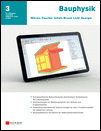
Bauphysik
Transforming Research into Architectural ExcellenceBauphysik, published by ERNST & SOHN, is a prestigious journal dedicated to the fields of architecture, building construction, and environmental engineering. With a strong focus on the principles of building physics, Bauphysik serves as a key platform for researchers, professionals, and students alike, disseminating vital information and advancements within the industry. The journal, boasting an ISSN of 0171-5445 and an E-ISSN of 1437-0980, is well-regarded with a categorization in the Q2 quartile in Architecture and Q4 quartiles in Building and Construction and Environmental Engineering as of 2023. Its Scopus ranks further highlight its impact within the community, with rankings of 83/189 in Architecture, 179/223 in Building and Construction, and 167/197 in Environmental Engineering. Despite its lack of open access options, the journal's retrospective convergence from 1982 to 2024 marks its long-standing influence in advancing building physics research. With a dedicated readership, Bauphysik encourages the exploration and sharing of innovative solutions to contemporary challenges in the built environment.

BUILDING RESEARCH AND INFORMATION
Exploring innovative solutions in Civil and Structural Engineering.BUILDING RESEARCH AND INFORMATION is a premier academic journal dedicated to the advancement of knowledge in the fields of Building and Construction as well as Civil and Structural Engineering. Published by Routledge Journals, Taylor & Francis Ltd, this journal boasts an impressive Q1 ranking in both categories as of 2023, emphasizing its reputation for disseminating high-quality research. Established in 1991, it has continually provided a vital platform for scholarly dialogue on innovative building practices, sustainable construction techniques, and cutting-edge engineering solutions, with ongoing contributions accepted until 2024. The journal is renowned for its extensive insights and interdisciplinary approach, and with a Scopus rank placing it in the 88th percentile for both building and construction engineering and civil and structural engineering, it presents an exceptional opportunity for researchers, professionals, and students to engage with and publish influential findings. While the journal is not open access, it remains a cornerstone for those aiming to deepen their understanding of contemporary challenges and trends in the built environment.

Revista Ingenieria de Construccion
Connecting Academics and Practitioners for Global ImpactRevista Ingenieria de Construccion is a prominent open-access journal dedicated to advancing knowledge and practice in the fields of building and construction engineering, as well as civil and structural engineering. Published by the Pontificia Universidad Católica de Chile, specifically the Department of Engineering and Construction Management, this journal has been providing free access to quality research outputs since 1986, ensuring that vital information is available to both practitioners and academics globally. With its current placement in the Q4 category of both the Building and Construction and Civil and Structural Engineering quartiles, it serves as a platform for innovative studies and critical discussions, positioning itself strategically within the academic landscape. The journal is indexed in Scopus, ranking #157 in Building and Construction and #291 in Civil and Structural Engineering, reflecting the growing impact and relevance of its contributions. Researchers, professionals, and students are encouraged to engage with the rigorous and diverse content published within its pages, fostering a vibrant academic and practical discourse.
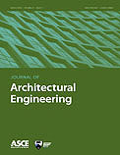
Journal of Architectural Engineering
Elevating Standards in Architectural Engineering ResearchThe Journal of Architectural Engineering, published by the ASCE (American Society of Civil Engineers), stands as a pivotal resource in the interdisciplinary fields of architecture and engineering. With an ISSN of 1076-0431 and E-ISSN 1943-5568, this journal has garnered a notable reputation since its inception in 1995, currently converging towards 2024. Boasting a Q1 ranking in Architecture and Visual Arts and Performing Arts, alongside respectable Q3 rankings in Building and Construction and Civil and Structural Engineering, the journal places itself in the elite class of scholarly publications, evidenced by its impressive Scopus rankings. Its commitment to providing cutting-edge research ensures comprehensive coverage across various aspects of architectural engineering, facilitating robust interdisciplinary dialogues. Although the journal operates under a traditional access model, its impact on the academic community remains profound, making it an essential platform for researchers, professionals, and students who seek to push the boundaries of knowledge in their respective fields. This journal not only aims to stimulate innovative ideas but also fosters a collaborative environment for advancing sustainable architectural practices in a rapidly evolving built environment.

Organization Technology and Management in Construction
Unlocking the potential of construction through shared knowledge.Organization Technology and Management in Construction is a prominent open-access journal dedicated to advancing knowledge in the fields of building and construction, civil and structural engineering, and the management of technology and innovation. Published by SCIENDO, this journal has established itself as a vital platform for researchers, professionals, and students since its inception in 2016, providing unrestricted access to cutting-edge research that drives the industry forward. With an impressive quartile ranking of Q2 in both Building and Construction and Civil and Structural Engineering, alongside respectable positions in various management categories, the journal serves as a critical resource for those seeking to explore innovative management approaches and technological advancements in construction. The journal's commitment to open access reflects a dedication to disseminating knowledge widely, ensuring that all stakeholders in the field can benefit from the latest developments. Operating out of Warsaw, Poland, the journal aims to foster collaboration and discourse among a diverse community of scholars and practitioners, playing an essential role in shaping the future of construction management.

Russian Journal of Building Construction and Architecture
Unlocking Insights for a Resilient Built EnvironmentRussian Journal of Building Construction and Architecture (ISSN: 2542-0526; E-ISSN: 2542-0526), published by the esteemed Voronezh State Technical University, serves as a vital platform for disseminating innovative research and practical applications in the fields of building construction and architecture. This journal, situated in Voronezh, Russia, aims to explore both the theoretical and empirical aspects of contemporary architecture and construction practices, fostering a robust dialogue among researchers, professionals, and academics. With an emphasis on open access to knowledge, the journal significantly contributes to global discourse by ensuring that findings are accessible to a wide audience. Underlining the importance of sustainable development and cutting-edge technologies in construction, the journal strives to publish high-quality research that addresses the challenges faced in today’s building environment, making it an invaluable resource for those committed to advancing the industry.
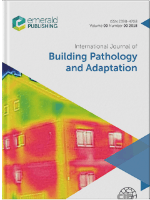
International Journal of Building Pathology and Adaptation
Bridging theory and practice for a sustainable future.International Journal of Building Pathology and Adaptation is a premier publication dedicated to advancing knowledge in the field of building pathology and adaptation. Established by the esteemed Emerald Group Publishing Ltd, this journal serves as a vital platform for researchers and practitioners focusing on the assessment, preservation, and innovative adaptation of built environments. With an impressive Q2 ranking in both Building and Construction and Civil and Structural Engineering, and a Scopus ranking of #62 out of 223 in the relevant engineering disciplines, the journal showcases high-quality research with significant practical implications. Although currently not featuring an open-access model, its access options cater to a wide audience aiming to explore cutting-edge studies from 2017 to 2024. The journal's commitment to bridging the gap between academic inquiry and real-world application makes it an essential resource for anyone dedicated to advancing the resilience and sustainability of the built environment.

Revista de la Construccion
Empowering Professionals with Insights from the Construction FrontierRevista de la Construcción is a pivotal academic journal dedicated to the field of civil engineering and construction, published by the prestigious Pontificia Universidad Católica de Chile, Escuela de Construcción Civil. With its ISSN 0718-915X, this journal serves as a crucial platform for disseminating innovative research, case studies, and advancements in construction methodologies that address contemporary challenges within the industry. While currently not classified as open access, it provides valuable insights benefiting researchers, professionals, and students engaged in construction development and sustainability. The journal enhances the academic discourse and contributes significantly to knowledge in engineering practices, project management, and material science. Based in Santiago, Chile, the journal aims to foster collaboration and knowledge exchange among experts both locally and globally, making it an essential resource for those striving to advance the science and practice of construction.